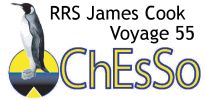Key Stage 3
SCIENCE:
'Key concepts': 1.4 Collaboration - sharing developments and common understanding across disciplines, noting that scientific investigation is predominantly undertaken by groups of scientists with different specialisms working in collaboration with each other.
Q: How many different kinds of scientists do we have in our expedition teams aboard ship, and what kinds of scientists are they?
'3.3 Organisms, behaviour and health': all living things show variation, can be classified and are interdependent, interacting with each other and the environment.
Q: What kinds of animals live in the deep ocean, and how do they interact with their environment?
'3.4 The environment, Earth and Universe': geological activity is caused by chemical and physical processes.
Q: Where in the world are undersea volcanoes, and what creates them?
'Curriculum opportunities': pursue an independent enquiry into an aspect of science of personal interest; use real-life examples as a basis for finding out about science; study science in global context; experience science outside the school environment.
Plenty of opportunities here for pupils to produce posters or projects about deep-sea vents, undersea volcanoes, deep-diving robot submarines, deep-sea creatures etc! And we're always happy to answer their questions - please use the email contact the Schools main page to send questions to us, or to arrange a live webchat for your class with expedition members aboard ship.
Other curriculum links
Primary curriculum: scientific knowledge and technological understanding
Expedition diary
Check out our regular reports on the progress of the expedition, and what we're finding on the ocean floor.
What's happening aboard?
Expedition team
Meet our team of scientists and engineers exploring the ocean depths aboard the research ship James Cook
Who are we?
